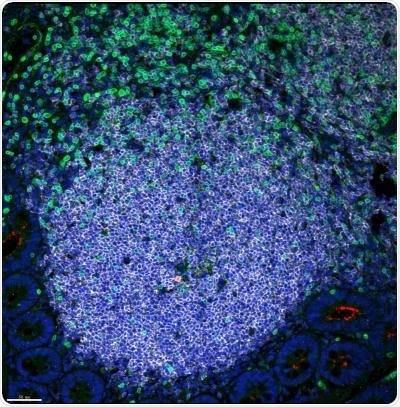A team of researchers from the University of California - Davis Health (UC Davis) has made a breakthrough discovery of a unique type of stem cell that reduces the amount of the virus that causes AIDS.

HIV disrupts the lymphoid immune battleground. Image Credit: UC Regents.
This can boost the body’s antiviral immunity and thus repair and restore the lymphoid follicles of the gut impaired by the simian immunodeficiency virus (SIV)—the equivalent of the human immunodeficiency virus (HIV) in non-human primates.
Recently published in the JCI Insight journal, the study demonstrated the mechanism by which mesenchymal stem/stromal cells (MSCs) improve the body’s immune response to the virus. The study also offers a roadmap for designing multi-pronged HIV eradication approaches.
Impaired immune functions in HIV infection and incomplete immune recovery pose obstacles for eradicating HIV. Our objective was to develop strategies to boost immunity against the virus and empower the host immune system to eradicate the virus. We sought to repair, regenerate and restore the lymphoid follicles that are damaged by the viral infection.”
Satya Dandekar, Study Senior Author, Professor, and Chairperson, Department of Medical Microbiology and Immunology, UC Davis
Within the gut, the lymphoid tissue acts as an early site for the replication of viruses and the establishment of viral reservoirs. Dandekar’s research team has already demonstrated that an HIV infection leads to a severe loss of gut mucosal T immune cells and disturbs the gut epithelial barrier lining, resulting in a leaky gut.
The lymphoid follicles are organized structures where the long-term immune attack is launched against pathogens by generating antibody response targeting the virus. These important regions are functionally impaired very early following HIV infection.”
Satya Dandekar, Study Senior Author, Professor and Chairperson, Department of Medical Microbiology and Immunology, UC Davis
Viral replication can be effectively suppressed by antiviral drugs, but these drugs do not repair the damage induced to the immune system by the virus. These drugs, on their own, cannot restore the functionality of the lymphoid follicles impaired by HIV infection.
Can stem cells counteract the gut damage caused by HIV?
The team injected bone marrow-derived MSC in a rhesus macaque model of AIDS that had damaged immunity and disrupted the functions of the gut because of the viral infection.
Professor Dandekar, who is also affiliated with the California National Primate Research Center, added, “We are starting to recognize the great potential of these stem cells in the context of infectious diseases. We have yet to discover how these stem cells can impact chronic viral infections such as AIDS.”
This latest study found that the MSCs are capable of modulating, altering, and remodeling the impaired mucosal site. Immediate benefits were observed with a sudden rise in T-immune cells and the virus being targeted by antibodies. The stem cells were crucial in the recovery and restoration of such lymphoid follicles.
MSCs also provide an opportunity for a novel, multi-pronged HIV cure strategy by complementing existing HIV treatments.
Stem cells are good synergistic partner components with drugs. The antiretroviral drugs can stop the fire of the viral infection but cannot restore the forest of the lymphoid tissue compartment. The MSCs would rejuvenate the field and bring back immune vitality.”
Satya Dandekar, Study Senior Author, Professor, and Chairperson, Department of Medical Microbiology and Immunology, UC Davis Health
MSCs effectively increased the antiviral response of the host by repairing the lymphoid follicles, reviving what has been targeted by the virus very early, and restoring the mucosal immunity, without the use of any antiviral drugs.
MSC treatments
MSC treatments need specific delivery mechanisms and well-defined cell quality controls. The UC Davis Stem Cell Program—a center for excellence for stem cell research—is heading numerous clinical trials on the use of MSCs in treating various diseases, like Huntington’s disease and spina bifida. The study results offer a scientific basis for analyzing MSC in treating various infectious diseases, including HIV, in clinical settings.
Source:
Journal reference:
Weber M. G., et al. (2021) Gut germinal center regeneration and enhanced antiviral immunity by mesenchymal stem/stromal cells in SIV infection. JCI Insight. doi.org/10.1172/jci.insight.149033.